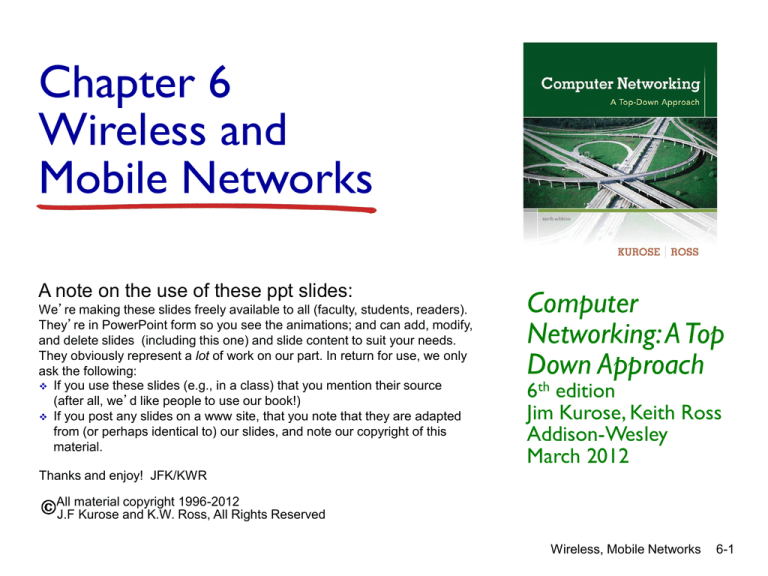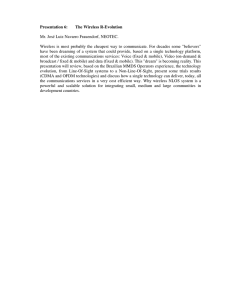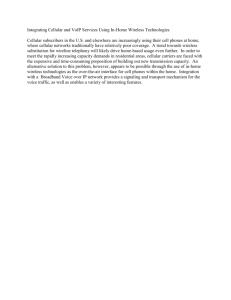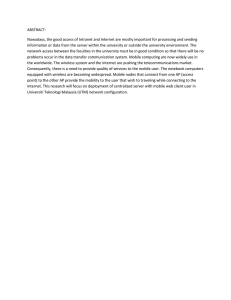
Chapter 6
Wireless and
Mobile Networks
A note on the use of these ppt slides:
We’re making these slides freely available to all (faculty, students, readers).
They’re in PowerPoint form so you see the animations; and can add, modify,
and delete slides (including this one) and slide content to suit your needs.
They obviously represent a lot of work on our part. In return for use, we only
ask the following:
If you use these slides (e.g., in a class) that you mention their source
(after all, we’d like people to use our book!)
If you post any slides on a www site, that you note that they are adapted
from (or perhaps identical to) our slides, and note our copyright of this
material.
Computer
Networking: A Top
Down Approach
6th edition
Jim Kurose, Keith Ross
Addison-Wesley
March 2012
Thanks and enjoy! JFK/KWR
All material copyright 1996-2012
J.F Kurose and K.W. Ross, All Rights Reserved
Wireless, Mobile Networks
6-1
Elements of a cellular wireless network
network
infrastructure
This is the
figure your
textbook uses.
I Like these
figures
better.
"PSTN" means the Public
Switched Telephone
Network
"PDN" means the Public
Data Network
Wireless, Mobile Networks
6-2
Elements of a cellular wireless network
Wireless, Mobile Networks
6-3
Chapter 6 outline
6.1 Introduction
Mobility
Wireless
6.5 Principles: addressing and
routing to mobile users
6.6 Mobile IP
6.7 Handling mobility in
cellular networks
6.8 Mobility and higher-layer
protocols
6.2 Wireless links,
characteristics
CDMA
6.3 IEEE 802.11 wireless
LANs (“Wi-Fi”)
6.4 Cellular Internet Access
architecture
standards (e.g., GSM)
6.9 Summary
Wireless, Mobile Networks
6-4
Code Division Multiple Access (CDMA)
unique “code” assigned to each user; i.e., code set
partitioning
all users share same frequency, but each user has own
“chipping” sequence (i.e., code) to encode data
allows multiple users to “coexist” and transmit
simultaneously with minimal interference (if codes are
“orthogonal”)
encoded signal = (original data) X (chipping
sequence)
decoding: inner-product of encoded signal and
chipping sequence
Wireless, Mobile Networks
6-5
CDMA encode/decode
sender
d0 = 1
data
bits
code
Zi,m= di.cm
-1 -1 -1
1
-1
1 1 1
-1 -1 -1
slot 1
-1
slot 1
channel
output
1
-1
1 1 1 1 1 1
1
d1 = -1
1 1 1
channel output Zi,m
-1 -1 -1
slot 0
1
-1
-1 -1 -1
slot 0
channel
output
M
Di = S Zi,m.cm
m=1
received
input
code
receiver
1 1 1 1 1 1
1
-1 -1 -1
-1
1 1 1
1
-1
-1 -1 -1
-1
1 1 1
-1 -1 -1
slot 1
M
1
1
-1
-1 -1 -1
slot 0
d0 = 1
d1 = -1
slot 1
channel
output
slot 0
channel
output
Wireless, Mobile Networks
6-6
CDMA: two-sender interference
Sender 1
channel sums together
transmissions by sender 1
and 2
Sender 2
using same code as
sender 1, receiver recovers
sender 1’s original data
from summed channel
data!
Wireless, Mobile Networks
6-7
Chapter 6 outline
6.1 Introduction
Wireless
6.2 Wireless links,
characteristics
CDMA
6.3 IEEE 802.11 wireless
LANs (“Wi-Fi”)
6.4 Cellular Internet access
architecture
standards (e.g., GSM)
Mobility
6.5 Principles: addressing and
routing to mobile users
6.6 Mobile IP
6.7 Handling mobility in
cellular networks
6.8 Mobility and higher-layer
protocols
6.9 Summary
Wireless, Mobile Networks
6-8
Components of cellular network architecture
MSC
connects cells to wired tel. net.
manages call setup (more later!)
handles mobility (more later!)
cell
covers geographical
region
base station (BS)
analogous to 802.11 AP
mobile users attach to
network through BS
air-interface: physical
and link layer protocol
between mobile and BS
Mobile
Switching
Center
Public telephone
network
Mobile
Switching
Center
wired network
Wireless, Mobile Networks
6-9
Cellular networks: the first hop
Two techniques for sharing
mobile-to-BS radio spectrum
GSM/TDMA: divide each
channel into time slots
CDMA: code division multiple
access
Wireless, Mobile Networks 6-10
2G (voice and text) network architecture
Base station system (BSS)
MSC
BTS
G
BSC
Public
telephone
network
Gateway
MSC
Legend
Base transceiver station (BTS)
Base station controller (BSC)
Mobile Switching Center (MSC)
Mobile subscribers
Wireless, Mobile Networks 6-11
3G (voice+data) network architecture
MSC
G
radio
network
controller
Gateway
MSC
G
SGSN
Key insight: new cellular data
network operates in parallel
(except at edge) with existing
cellular voice network
voice network unchanged in core
data network operates in parallel
Public
telephone
network
Public
Internet
GGSN
Serving GPRS Support Node (SGSN)
Gateway GPRS Support Node (GGSN)
Wireless, Mobile Networks 6-12
3G (voice+data) network architecture
MSC
G
radio
network
controller
Public
telephone
network
Gateway
MSC
G
SGSN
Public
Internet
GGSN
radio interface
(WCDMA, HSPA)
radio access network
Universal Terrestrial Radio
Access Network (UTRAN)
core network
General Packet Radio Service
(GPRS) Core Network
public
Internet
Wireless, Mobile Networks 6-13
Opensignal.com
Wireless, Mobile Networks 6-14



